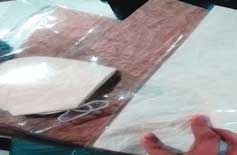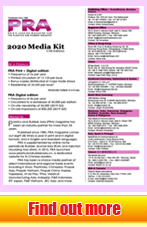PPEs: biodegradable/nonplastic alternatives sought
To contain the “other epidemic” of plastic materials, PPEs made of non-plastic and alternative materials are being developed as counter measures to the environmental impact of PPEs being discarded and littering the environment, says Angelica Buan in this report.
Demand overtakes supply
At first glance, it is merely a piece of a moisture repellent cloth with strings. The use of medical masks, commonly made of non-woven fabrics made from plastics like PP, to repel, filter and protect user s, was mostly conf ined to hospital settings dur ing the pre-Covid-19 era. But when the new coronavirus pandemic broke out, demand for masks and other personal protective equipment (PPE) spiked tremendously causing demand to outpace supply and PPEs becoming priceless commodities.

In fact, the US Food and Drug Administration (FDA) and the World Health Organisation (WHO) acknowledged the limited access of PPEs, with supply deficit spreading globally. In early March, WHO sought for an increase in manufacturing by 40% to meet rising global demand. It had estimated that 89 million medical masks/month were required to meet the Covid-19 response. The situation has exposed the vulnerability of the PPE supply chain during the course of the pandemic.
The Pandemic Supply Chain Network (PSCN), a public-private collaboration formed by WHO and the WeForum aims at addressing supply security, as well as access to PPEs.
In the earlier months into the pandemic, PPEs, specifically disposable face masks, had been advised by the WHO to be limited for use for medical and healthcare frontliner s and essential workers to augment the supply. But containment measures around the world have eventually been readjusted as infection spread continues unabated in several countries globally.
Scarcity breeds opportunities
In the Philippines, where the number of morbidity and mortality cases from coronavirus infections is increasing, PPE use, specifically masks and face shields, has become mandatory, especially in public places and transportation. Despite the inflow of monetary and PPE donations from foreign countries, supply security remains a hitch in the country’s pandemic response.
The Philippine Plastics Industry Association (PPIA), the country’s association of plastic fabricators with members engaged in moulding, extrusion, weaving, lamination and recycling, has taken up the challenge to produce the materials for PPEs locally to close the supply chain gap; and deliver PPEs to front liner s rapidly.

PPIA President Vicente Co and National Solid Waste Management Commissioner Crispian Lao said that localisation (of manufacturing) not only generates the much needed jobs, but also buffers the country against the impact of supply shortage. The locally produced non-woven PP materials can be made into disposable protective coveralls for healthcare workers as well asessential workers.
Additionally, PPIA, collaborating with Prima Plastic Manufacturing Corporation and ExxonMobil Chemical, has developed an alternative material using a PE-based solution.
Overcoming development glitches, such as the samples of the PE-based film being prone to tearing when sewn, Prima Plastics has added cellophane tape to reinforce the stitching. To make it durable, ExxonMobil supplied its metallocene PE compound as the basis for the primary formulation.
PPIA said that it is further developing the material and starting to scaling the production of PE-based PPEs (coveralls and gowns) using the locally-produced material.
PE and PP are highly recyclable post treatment materials, and can be recycled into trash bags, crates and pallets or utilised in waste-asphalt bitumen for road applications, though in the case of medical use PPE, the toxicity may not allow for recycling.
Plastic-free solutions abound in the Philippines

The assurance of a stable supply of PPEs, on the other hand, begets another worrisome situation for the Philippines that was ranked among the biggest plastic polluters in the world in a 2015 Ellen MacArthur Foundation ocean plastics report. The country, dealing with mounting waste plastics, mainly from single-use plastics, would have to wrestle with plastic waste that would be added on from discarded PPEs.
Environmental group Greenpeace cautions against the environmental implication of the increased use of PPEs, stating that this indeed would “add another level to an already severe global waste issue”
Shifting to biodegradable and biobased materials has always been the go-to solution, even with packaging or other applications that require plastics.
The Philippines, where Covid-19 cases already crossed the 160,000 count in mid-July, has taken to introducing biobased masks not only to combat plastic waste but also to utilise its endemic raw materials.
Read more...
(PRA) Subscribe to Get the Latest Updates from PRA Please click here
©2020 Plastics and Rubber Asia. All rights reserved.

©2020 Plastics and Rubber Asia. All rights reserved.
Home Terms & Conditions Privacy Policy Webmail Site Map About Us





















